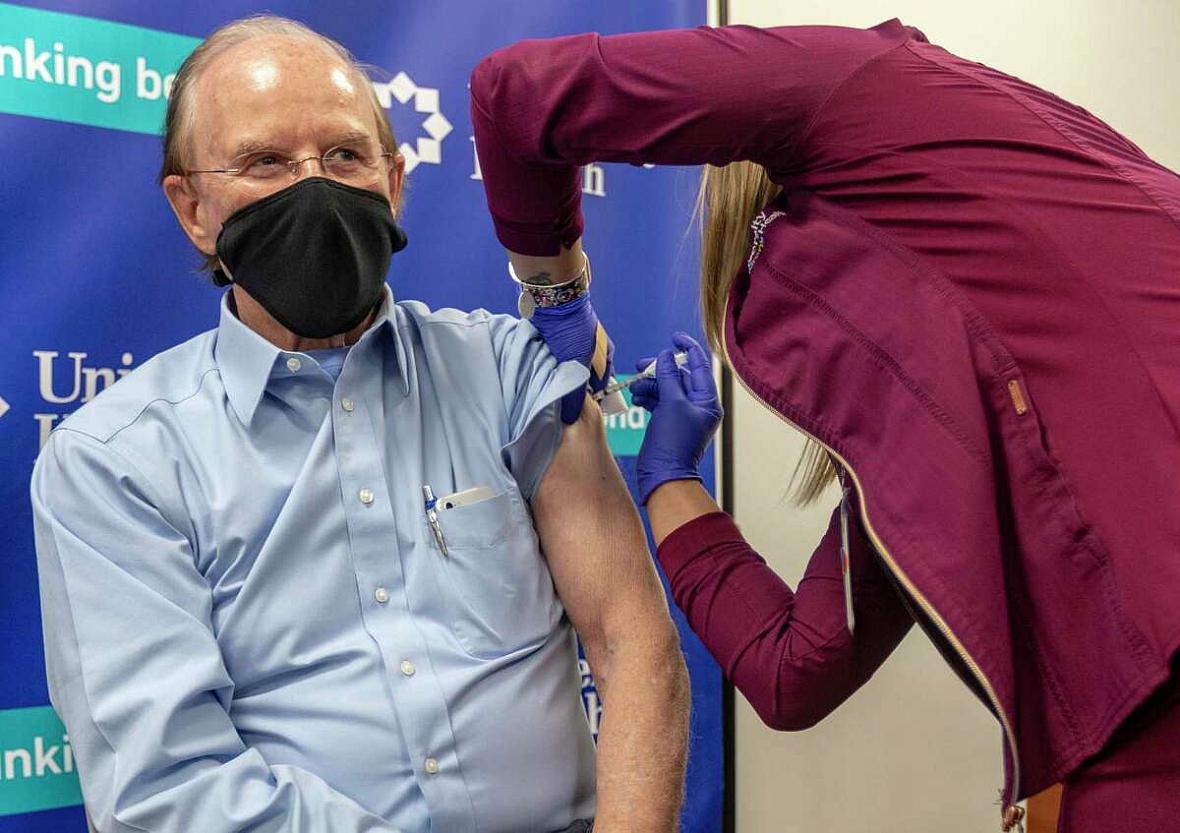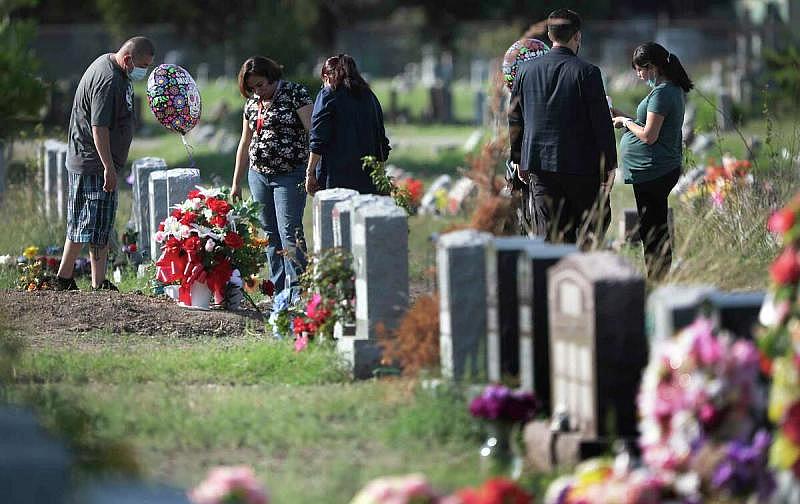Bexar County working to fix health disparities documented in E-N series with ARPA funds
This story was produced as part of a larger project led by Laura Garcia for the USC Annenberg Center for Health Journalism’s 2021 National Fellowship.
Other stories in Garcia's series include:
A broken system got worse: How COVID ravaged San Antonio’s South Side

Bexar County Judge Nelson Wolff receives his COVID-19 vaccination Wednesday, Dec. 30, 2020 at University Hospital from medical assistant Brenda Gutierrez. Wolff said the 5,300 who have died after four surges of the disease during the pandemic “lost their lives long before they should have.” The county is launching an initiative to address geographic health disparities that surfaced during the pandemic.
William Luther, Staff / William Luther
By Scott Huddleston
Bexar County Manager David Smith will hire a county public health director and other core staff as part of an initiative to revamp health care in fast-growing outlying areas of the community, filling gaps in service that he said were revealed by the COVID-19 pandemic.
Smith secured initial support from county commissioners this week to reorganize about 16 health-related functions the county provides and put them under one organizational structure “so that the next pandemic, we have a more robust, rapid and coordinated response.”
“Whoever’s sitting in Judge Wolff’s chair at that time, as the authority in the event of a pandemic, will be able to pick up the phone, make one phone call and get things done” to launch a coordinated response, Smith told commissioners.
He estimates the initiative, including public outreach, will cost about $2 million annually. Initial funding will come from $60 million the county recently set aside from the federal American Rescue Plan Act to expand public health services. The federal funds must be committed by the end of 2024 and spent by the end of 2026.
The county initiative also includes a new public health division under University Health, which plans to utilize six health units, including two that are mobile, as well as four health centers and a health task force to address geographic disparities.
Smith said the pandemic and its economic effects have aggravated inequities that influence health outcomes, such as economic stability and access to quality education and health care, and left many people delaying medical care and routine checkups.
Two maps from the Express-News’ recent “Access Denied” project highlighting health inequities in Bexar County tell the story, Smith said as he showed commissioners the images during his presentation. The maps revealed a correlation between ZIP codes that experience high levels of diabetes and those with elevated rates of COVID-19 deaths per capita, particularly in San Antonio’s inner city and southern fringes of the county.

“To me, these two maps are a sort of visual mission statement for this new department that I’m forming. It is to try and make these health care outcomes more evenly distributed throughout our community,” Smith said.
A 2020 report by the Centers for Disease Control and Prevention estimated that 94 percent of Americans who died of COVID-19 during the initial surge of the pandemic had underlying health conditions such as heart disease or diabetes.
“These people lost their lives long before they should have,” Bexar County Judge Nelson Wolff said of the 5,300 county residents who died after being infected with the coronavirus.
Smith said he’ll hire a health director, nutrition specialist and dietitian initially and present a detailed plan during the August-September county budget process. Current county programs and services, from animal control and code compliance to air quality and mental and behavioral health, will be under the new county Department of Preventative Health and Environmental Services that will coordinate with the city’s Metropolitan Health District, University Health, suburban cities and other “health-related partners.”
Smith also hopes to destigmatize mental health issues that have surfaced during the pandemic.
“I wish as a society we’d just get away from this distinction between physical health and mental health. They’re all one package,” Smith said.
On ExpressNews.com: Access denied: How we analyzed the data
Commissioner Rebeca Clay-Flores, who worked for the city’s Metro Health for six years and has mentioned problems she witnessed at that agency, said partnerships with nonprofits and churches could help the county reach pockets in the community that are hardest to serve.
“In the middle of a pandemic, it’s too late to build relationships,” she said.
Commissioner Tommy Calvert said their efforts need to carefully target areas affected by federally recognized social determinants of health such as racism, pollution and service gaps in housing, transportation, nutrition, recreation, language and literacy.
“I have not seen, in the thought process of the funding, an embrace of the national standards. And I don’t want us to be behind again in Bexar County-San Antonio. I want us to be at the cutting edge of this,” Calvert said.
The Express-News, following the recent in-depth series on health disparities, will hold a free Access Denied Health Fair from 9 a.m. to 1 p.m. Saturday, May 28, at the Wesley Health and Wellness Center, 1406 Fitch St. Express-News Reporter Laura Garcia will discuss inequities on the South Side and possible solutions with a panel of experts.
shuddleston@express-news.net
[This story was originally published by San Antonio Express-News.]

